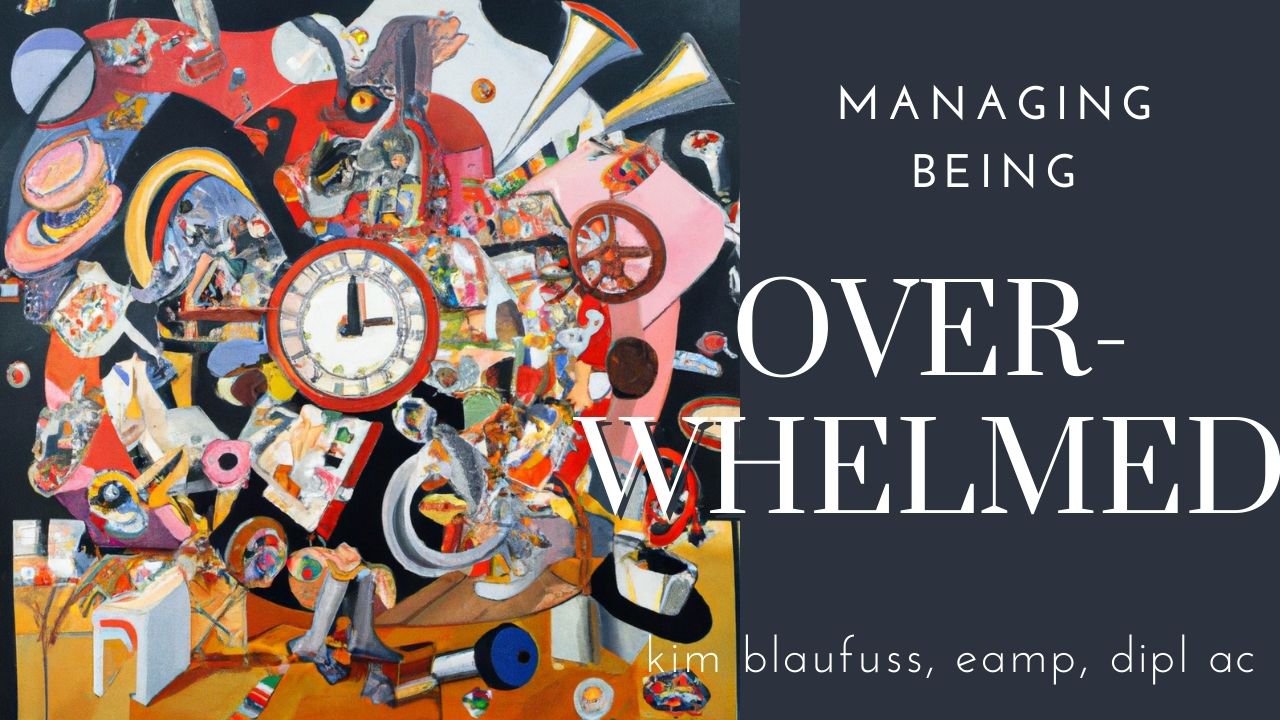Feeling overwhelmed can take a toll on you, both physically and emotionally. It can be hard to focus, and it can feel like you’re constantly running on empty. Remember it’s normal to feel overwhelmed and it’s not a sign of weakness. Finding ways to manage and reduce those feelings is important for your well-being and balance in life. Here are some healthy ideas to help you deal with life opening the flood gates.
Prioritization Can Reduce Feeling Overwhelmed
Prioritizing helps to keep you afloat when life becomes overwhelming because it allows you to focus on the most critical tasks and responsibilities. This can help reduce feelings of stress and anxiety and prevent you from getting bogged down by less important tasks. Additionally, when you prioritize, you can set realistic expectations for yourself and manage your time more effectively, which can help you feel more in control of your life and less overwhelmed.
There are several ways to figure out how to prioritize tasks and responsibilities:
- Make a list: Write down all of the tasks and responsibilities that you need to complete. This will give you a clear overview of everything that you need to do.
- Identify priorities: Look at each task on your list and decide which ones are most important. These are the tasks that need to be done first.
- Use a priority matrix: A priority matrix is a tool that helps you to categorize tasks by level of importance and urgency. Tasks that are both important and urgent should be done first, followed by tasks that are important but not urgent, and so on.
- Take into account your goals: Prioritize the tasks that align with your personal or professional goals, and that will bring you closer to achieving them.
Ultimately, the way you prioritize will depend on your own personal needs, preferences and goals. It may take some trial and error to figure out the best way for you to prioritize tasks and responsibilities, but with practice, you will be able to do it more effectively.
Learning A Healthy Way To Take A Break
 Taking a break can be an effective way to help reduce feelings of overwhelm. Here are some tips for taking a break:
Taking a break can be an effective way to help reduce feelings of overwhelm. Here are some tips for taking a break:
- Disconnect: Step away from your work or the task causing you to feel overwhelmed. Put your phone on silent, log out of email, and take a break from social media.
- Engage in physical activity: Going for a walk, run, or bike ride can help to release tension and clear your mind.
- Practice relaxation techniques: Engage in deep breathing exercises, yoga, or mindfulness meditation to help reduce feelings of stress and anxiety.
- Do something fun: Engage in a hobby or activity you enjoy, such as reading, listening to music, or watching a movie.
- Take a nap: If you’re tired, a short nap can help refresh your mind and improve your mood.
- Connect with nature: Spending time in nature can help reduce stress and anxiety and improve your overall well-being.
- Make time for yourself: Schedule a regular time to relax and unwind, whether it’s a daily break or a longer break each week.
It’s important to remember that taking a break doesn’t have to be long; it can be as short as 5 minutes, but it should be consistent and regular. Also, remember that breaks are not a way to procrastinate or avoid responsibilities but to recharge and be more productive in the long run.
Why Self-care Matters
Prioritizing self-care can help you overcome overwhelming feelings because it allows you to care for your physical and mental well-being. When you’re feeling overwhelmed, it’s easy to neglect self-care, but making it a priority can help reduce stress and anxiety and improve your overall well-being. Here are a few ways that prioritizing self-care can help:
- Reducing stress: Engaging in self-care activities, such as exercise, meditation, or deep breathing, can help reduce stress and anxiety.
- Improving sleep: Prioritizing self-care, such as getting enough sleep, can help to improve your mood, energy levels, and ability to focus.
- Eating well: Eating a healthy diet with a variety of fruits, vegetables, and whole grains, can help to support good physical and mental health.
- Building resilience: Prioritizing self-care can help you build resilience and the ability to cope with difficult situations.
- Recharging energy: Engaging in self-care activities like a hobby you love can help you to recharge your energy and feel more balanced, and in control of your life.
- Improving overall well-being: By prioritizing self-care, you can improve your overall well-being, both physically and mentally.
It’s important to remember that self-care is not a one-time thing, but a consistent practice that should be incorporated into your daily routine. Also, it’s important to recognize that self-care looks different for everyone, and it can be different activities for different people. The most important thing is to find what works for you and make it a priority.
Sharing With Others Helps Reduce Feeling Overwhelmed
 Talking to someone can be a helpful way to cope with feelings of being overwhelmed. Here are a few ways that talking to someone can help:
Talking to someone can be a helpful way to cope with feelings of being overwhelmed. Here are a few ways that talking to someone can help:
- Providing a different perspective: Talking to someone else about your feelings and experiences can help to provide a different perspective and new insights.
- Offering emotional support: Talking to someone who is supportive and understanding can help you to feel less alone and more validated in your feelings.
- Helping to process emotions: Talking through your feelings with someone else can help you to process and make sense of your emotions.
- Finding solutions: Talking to someone who can offer advice and guidance can help you to find solutions to the challenges you’re facing.
- Releasing pent-up emotions: Expressing your feelings to someone can be a way to release pent-up emotions and reduce feelings of stress and anxiety.
- Making a plan: Talking to someone can help you to make a plan of action to tackle the things that are causing you to feel overwhelmed.
It’s important to note that talking to someone does not have to be a therapist or a professional, it can be anyone who you trust and feel comfortable with, such as a friend, family member or a mentor. Also, different people have different preferences for communication, some may prefer talking face-to-face, others may prefer talking over the phone or writing, so it’s important to consider the best way for you to communicate.
Why Saying “No” Can Be Healthy
 Learning to say no can be an effective way to help manage overwhelming feelings. Here are a few ways that learning to say no can help:
Learning to say no can be an effective way to help manage overwhelming feelings. Here are a few ways that learning to say no can help:
- Reducing your workload: Saying no to tasks or obligations that are not a priority or that you cannot handle can help reduce your workload and make it more manageable.
- Protecting your time: Saying no allows you to prioritize your time and energy for the most important things.
- Reducing stress: Saying no to things that you are not able to do or not interested in doing can help to reduce feelings of stress and anxiety.
- Improving your boundaries: Learning to say no can help you to set and maintain healthy boundaries, which is vital for your physical and mental well-being.
- Improving your focus: Saying no to unnecessary tasks and distractions can help you focus on the most important things.
- Improving your self-esteem: Saying no to things not aligned with your values or goals can help you feel more in control of your life and improve your self-esteem.
It’s important to remember that saying no is not always easy, and it may take some practice to get comfortable with it. As you practice saying “no,” be mindful of doing it in a respectful way that communicates your needs and intentions. Additionally, it’s essential to understand that saying no to some things doesn’t mean you have to say no to everything. It’s about finding a balance that works for you.
Managing feelings of overwhelm is vital for positive emotional health. Finding ways to reduce and manage them can help you focus better, make better decisions, and have more energy for things that matter. It also allows you to build resilience and coping skills to navigate difficult situations, positively impacting your emotional well-being. Remember, finding what works for you may take time, but taking the first step is crucial.

